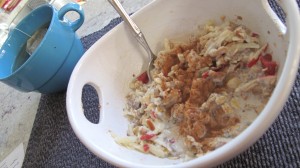Traditional Meusli

Try a bowl of traditional muesli as a breakfast, snack, or light dinner. One of the most nourishing comfort foods!
Bowl of Health
Traditional muesli is a nourishing cereal popularized in the early 1900s by a Swiss physician named Maximillian Bircher-Benner. He developed the dish to feed patients in his hospital to nurse them back to health.
Interestingly, the ingredients in muesli are very similar to the staples of a saatvic diet, which is said to be the most healthful diet for yoga practitioners because it is nourishing to the body while allowing the mind to maintain a peaceful state.
This dish has has many forms and can be varied according to one’s personal taste or health preferences. Generally it is prepared using rolled oats (which can be made gluten free) that have been soaked in water, milk, or juice, as well as nuts, seeds, grated or chopped fresh or dried fruits, and spices. The recipe below is just a suggestion. Try it out, or comment with your variation, s’il vous plait.
Ingredients:
2 cups gluten free oats
1/2 cup chopped walnuts/pecans
1/2 cup sunflower seeds
1/2 cup golden raisins (or other dried fruit)
4 tbs. chia seeds
*Mix above ingredients in a jar. Makes almost four cups.
Method:
When ready to eat, mix 3/4 cup of above mix with:
1-2 tbs. flax meal
1/2-1 grated apple or 1/2-1 cup berries
1 cup fresh almond milk
pinch nutmeg
pinch cinnamon
*Mix together and allow to sit for a few minutes before eating. Enjoy!
Health Benefits:
Rolled Oats: Due to their high fiber content, oats are known to help remove cholesterol from the digestive system that would otherwise end up in the bloodstream. Oats also help maintain cardiovascular health since they contain antioxidant compound called avenanthramides, which help prevent free radicals from damaging LDL cholesterol. Oats, oat bran, and oatmeal also contain a specific type of fiber known as beta-glucan, which has been shown to help immune funtion and to stabilize blood sugar. Oats are also high in manganese, selenium, and phosphorous. See here for more health benefits and nutritional information.
Walnuts: Walnuts are powerful medicine. They are packed with valuable antioxidants and anti-inflammatory nutrients such as omega fatty acids, manganese, and copper. Walnuts have been studied and proven to help decrease risk of certain cancers, including prostate and breast. They also help prevent cardiovascular problems and type 2 diabetes. See here for more health benefits and nutritional information.
Pecans: Pecans contain a plethora of vitamins and minerals including vitamin A, vitamin E, folic acid, calcium, magnesium, phosphorus, potassium, a variety of B vitamins and zinc. One ounce of pecans provides 10 percent of the recommended Daily Value for fiber. Pecans are also a source of monounsaturated or “good” fat and protein. See here for more health benefits and nutritional information.
Sunflower Seeds: A handful of sunflower seeds will supply significant amounts of vitamin E (the body’s primary fat-soluble antioxidant, which is also an anti-inflamatory and cardiovascular health superstar), magnesium (which has been said to help reduce the severity of asthma, lower high blood pressure, and prevent migraine headaches, as well as reducing the risk of heart attack and stroke), and selenium (helpful for DNA and cellular repair). See here for more health benefits and nutritional information.
Raisins: Raisins are high in fiber witch can aid in relief of constipation. They a good source of iron (thus helping with anemia), arganine (which can enhance libido and aid with sexual weakness). They also contain calcium and boron, both of which are crucial for proper bone health. See here for more health benefits and nutritional information.
Chia Seeds: “Chia” is the Mayan word for strength. Once an important energy source for Mayans, Incas and other ancient cultures, they are now favored by athletes and birthing mothers for their strength and energy enhancing properties. They are a great source of omega-3 acids, calcium, protein, fiber and potassium. Plus they’re low in cholesterol and sodium. See here for more health benefits and nutritional information.
Flax Seeds: Flax is one of the best sources of omega-3 fatty acids. They’re also high in lignans, fiber-like antioxidant compounds. They contain mucilage (gum), a water-soluble, gel-forming fiber that provides special support to the intestinal tract by helping improve the absorption of certain nutrients in the small intestine. Their antioxidant and anti-inflammatory benefits can also be helpful in cancer prevention and the quelling of chronic inflammation. Flaxseeds are also high in manganese, magnesium, and vitamin B1. See here for more health benefits and nutritional information.
Apple: Due to their water-soluble fiber (pectin) content, and their mix of polyphenols (antioxidants), apples can help decrease our total cholesterol and LDL-cholesterol. Also, the phytonutrients in apples can help regulate blood sugar. See here for more health benefits and nutritional information.
Blueberries: Blueberries are touted as a “superfood” and it’s no wonder why. Particularly wild organic blueberries contain a variety of antioxidant nutrients which support the whole body. Recent studies suggest that blueberries are also likely beneficial for improvement of memory, and help protect our nerve cells to help slow down the onset of other cognition issues frequently associated with aging. See here for more health benefits and nutritional information.